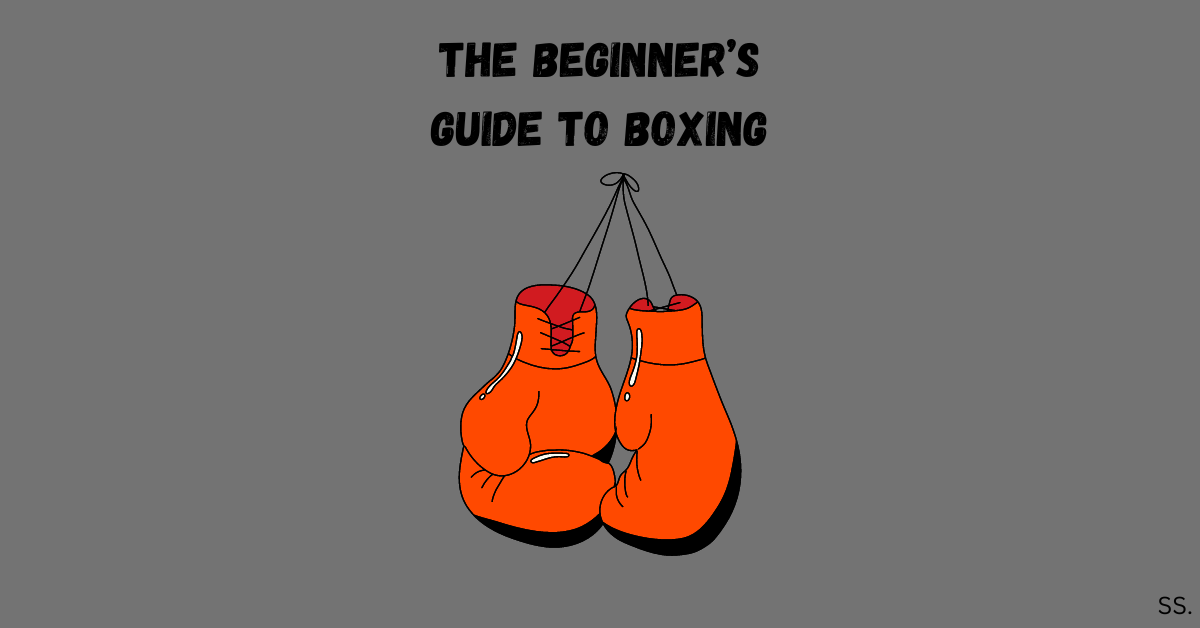Do you want to get into boxing but don’t know where to start? Our guide covers 19 tips for beginners to kick-start their boxing journey.
My name is Sunil and I have been boxing for over 7 years. The goal of this guide is to help you start your boxing journey. I have been in the exact same position as you were and if I had this guide years ago, I’m confident I would have progressed twice as quickly as I did.
There’s so much information out there about boxing and sometimes it can seem difficult to know where to start. You’re probably wondering about what equipment you need, what kind of gym you should join, and what technique you should use.
You might have tried shadow boxing at home, but you’re unsure if you’re doing it correctly. Or maybe the sight of a heavy bag is intimidating because you don’t know how to use it effectively.
The fear of making common mistakes or injuring yourself due to improper techniques might be holding you back from fully committing to this powerful and transformative sport.
Our comprehensive beginner’s guide to boxing is designed to eliminate your uncertainties and provide a clear, actionable path to kickstart your boxing journey. This guide covers everything from understanding the physical and mental benefits to selecting the right gear, mastering basic techniques, and choosing the perfect boxing gym.
You’ll learn about essential defensive moves, warm-up exercises, and conditioning workouts that enhance your skills. We’ll also talk about nutrition, hydration, and mental preparation to ensure you’re ready both physically and mentally. By following these 19 expert tips, you’ll gain confidence and improve your boxing skills efficiently and safely.
TL;DR:
- Learn the physical and mental benefits of boxing.
- Discover the essential gear needed for beginners.
- Tips on choosing the right boxing gym.
- Master basic stances, footwork, and punching techniques.
- Understand defensive techniques and warm-up routines.
- Explore conditioning workouts, sparring, and proper nutrition.
- Avoid common mistakes and enhance recovery with expert advice.
- Access valuable resources for continued learning in boxing.
What do you need to know about boxing?
Do you want to get into boxing but don’t know where to start? Our guide covers all of the basics for beginners to kick-start their boxing journey.
1. Introduction to boxing for beginners
Boxing is a dynamic and challenging sport that offers an excellent workout for both the body and mind. For beginners, stepping into the world of boxing can seem daunting, but with the right guidance, it becomes an exciting journey.
Boxing training involves learning various techniques, improving your fitness levels, and building mental toughness. Working with a knowledgeable boxing trainer can make all the difference, ensuring you master the basics correctly and safely. Whether you’re looking to compete or simply get fit, boxing provides a rewarding experience that enhances both physical and mental strength.
When I started my boxing journey, the hardest part was having the confidence to walk into the boxing gym knowing I might be the worst one there. From personal experience, the best thing you can do is just do it. Your coach will guide you and you’re most likely to meet other beginners in the same situation as you.
2. Physical and Mental Benefits of Boxing
Boxing is a comprehensive workout that engages your entire body weight, offering substantial physical benefits for individuals of all fitness levels. Unlike traditional exercises like lifting weights, boxing combines cardio with strength training, enhancing cardiovascular health and muscle tone simultaneously. Additionally, the mental challenges of developing a fight strategy and reacting quickly to opponents help improve focus and cognitive function. Whether you’re a seasoned athlete or a fitness novice, boxing can provide a full-body workout while boosting mental resilience and strategic thinking.
Boxing isn’t all in the fists! I realized this the first time I stepped into the ring to do sparring. The amount of thinking and mental work going on in your brain is immense. The ability to think quickly and analyze your opponent is just as essential as being fit.
3. Essential Boxing Gear for Beginners
To get started with boxing, you’ll need some essential gear. A good pair of boxing gloves is crucial for protecting your hands during training and sparring. Hand wraps are essential to prevent injuries. You’ll also need a jump rope to improve your footwork and cardiovascular fitness. Additionally, having access to a punching bag allows you to practice your techniques and build strength.
Most boxing gyms should be able to provide beginner gear however, it is best practice (and more hygienic!) to use your own gear. Besides, who doesn’t like picking their own gloves tailored to them? The further you get into your boxing journey, the more you can elevate your boxing gear by buying things such as boxing shoes, head protection, gum shields, etc.
If you’re unsure which size boxing gloves to get, check out our guide on how to choose the perfect size boxing gloves.
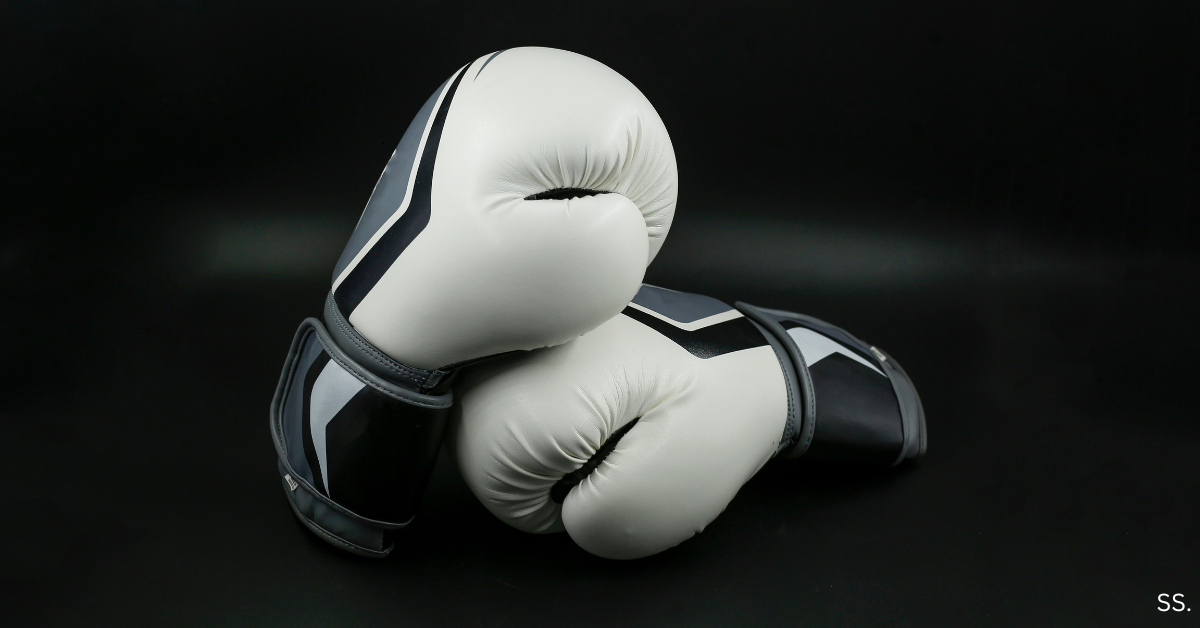
4. Choosing the Right Boxing Gym
Selecting the right boxing gym is vital for beginner boxers. Look for a gym with experienced trainers who can guide you from the basics to advanced techniques. Check if the gym offers beginner-friendly classes and has a welcoming environment.
For inspiration, consider the gyms where champions like Floyd Mayweather trained. As you progress, a good gym will provide opportunities to start sparring, helping you to apply what you’ve learned in a controlled, supportive setting.
5. Mastering Your Stance and Footwork
Proper stance and footwork are the foundations of boxing. Your lead foot should be positioned slightly forward, while your rear foot provides balance and mobility. Avoid leaning forward too much, as this can make you vulnerable to counterattacks. Keeping your feet shoulder-width apart ensures stability, allowing you to move quickly and efficiently. Mastering these basics will improve your overall technique and effectiveness in the ring.
Mastering your stance and footwork is key, but it won’t happen overnight. This might take weeks or months to master. The right footwork will help your punches have more power and will also help your defensive maneuvers become more sleek.
A good pair of boxing shoes will also help you.
6. Introduction to Punching Techniques
Learning proper punching techniques is essential for any boxer. Start with the basics, such as the straight punch, thrown with your rear hand for maximum power. Avoid poor technique by keeping your wrist straight and your elbows in. As you progress, practice combinations to enhance your speed and fluidity.
Understanding and executing these techniques correctly will significantly boost your performance and confidence in the ring.
The most important punch in boxing is the jab. This is led by your front hand which is generally going to be your quickest punch. You see boxing professionals like Floyd Mayweather still working on his jab to this day, which goes to show the importance of it. My advice is to build your speed on the lead hand (jab) and the backhand punch before moving on to the more technical punches such as left uppercut and right hooks.
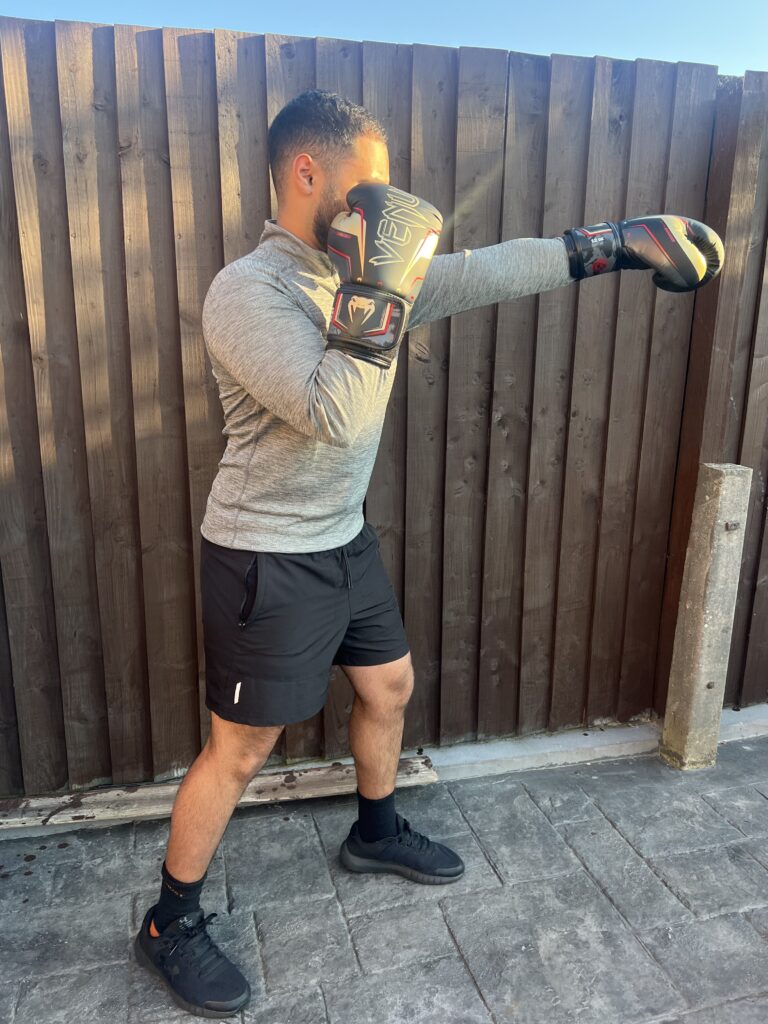
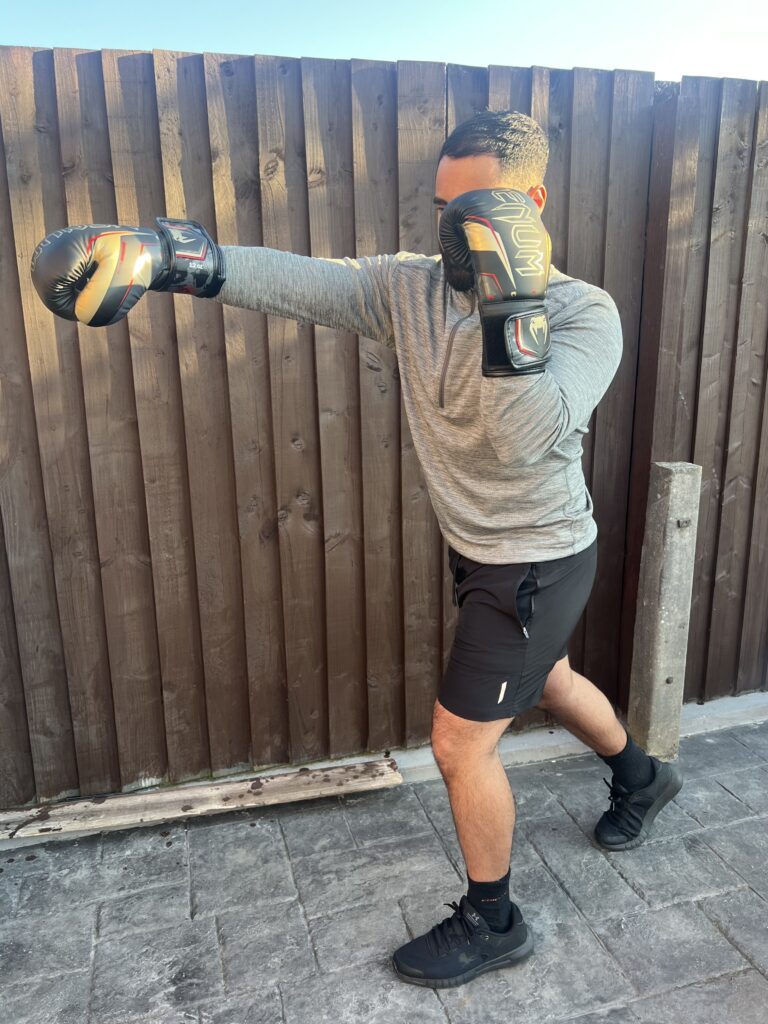
7. Defensive Techniques for Beginners
Effective defense is crucial in boxing. Beginners should focus on staying balanced with their feet shoulder-width apart and knees slightly bent. Practice keeping your guard up and using your arms to block and parry punches.
As you train, these defensive moves will become second nature, allowing you to anticipate and react to your opponent’s attacks instinctively.
I’m 99.9% sure that the first thing your coach will teach you when you start training is to keep your guard up at all times, this will soon become second nature to you. Once you advance more, you can learn other techniques that help with avoiding punches such as parrying, slipping, and dodging.
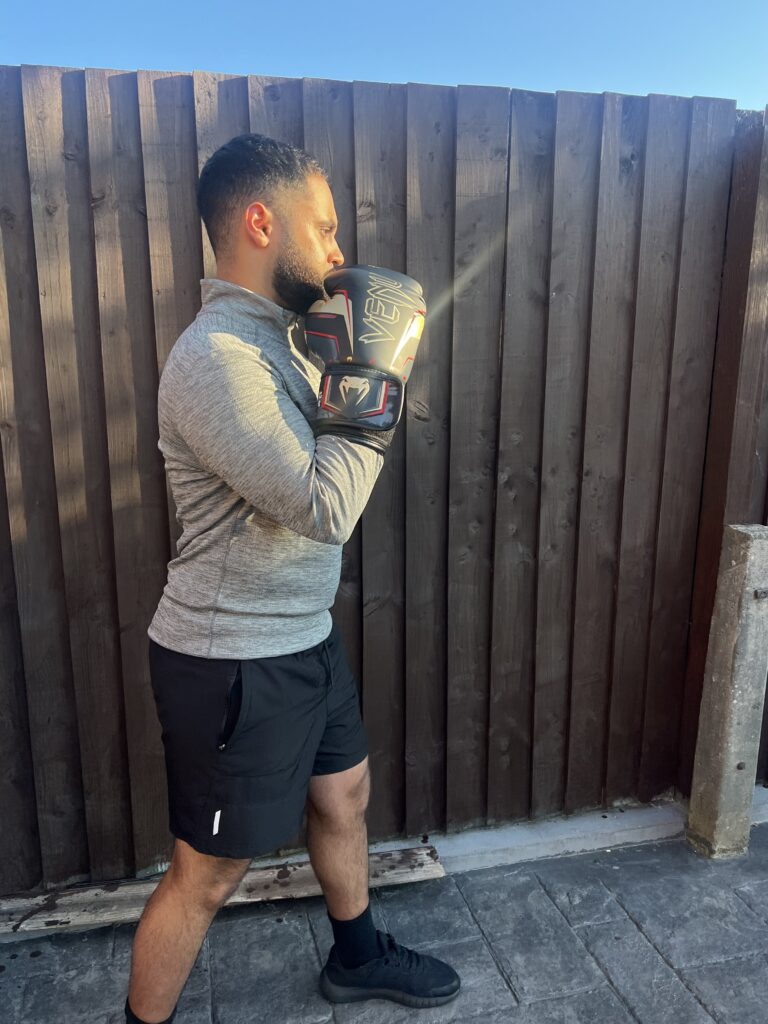

8. Warm-Up and Stretching Exercises for Boxers
A proper warm-up is essential before any boxing session. Start with dynamic exercises like jumping jacks or running in place to get your blood flowing. Follow up with stretching, focusing on key muscle groups like the shoulders, arms, and legs.
For instance, stretch your left arm across your body to prepare for throwing punches. Consistent warm-ups and stretches help prevent injuries and improve overall performance.
9. Cardio and Conditioning Workouts for Boxing
Cardio and conditioning are integral parts of any boxing training regimen. Begin with basic exercises like running or jumping rope to build endurance.
Incorporate interval training to improve your speed and stamina. While lifting weights can enhance your strength, boxing-specific workouts such as shadow boxing and heavy bag drills will better prepare you for the demands of the sport. These exercises ensure you’re in top shape for every stage of your boxing journey.
10. Boxing Drills for Skill Improvement
Drills are essential for honing your boxing skills. At your boxing gym, focus on drills that improve your punching power and accuracy. One effective drill is hitting the punching bag with controlled, powerful punches. Another is shadow boxing, which helps with movement and technique. These drills should be performed regularly to increase your ability to throw more punches effectively and enhance overall boxing performance.
Don’t underestimate the benefits of shadow boxing, it is a great way to improve quickly. Try to shadow box in front of a mirror for 3-5 rounds of 2 minutes at the beginning of your boxing session. Focus on things like; front foot positioning, keeping your guard up, body punches, defense, and combos.
11. Introduction to Sparring
Sparring is a crucial part of boxing training where you apply what you’ve learned in real time. It helps develop your fight strategy and improves your ability to think quickly under pressure.
Ensure you have quality gear, including headgear and mouthguards, for safety. Start with light sparring sessions to build confidence and gradually increase intensity. Remember to use your dominant hand effectively while keeping your defense strong.
Don’t be scared to spar. It can be daunting at the beginning but it will boost your confidence rapidly. Even if you are just boxing for fitness, make it known to your partner that you want a light sparring session. You can even go to the lengths of just body sparring or fake punching if you don’t want to get hit in the face.
12. Nutrition and Diet for Boxers
Nutrition plays a vital role in boxing. Adopting a balanced diet that includes lean proteins, complex carbohydrates, and healthy fats will fuel your training sessions and recovery. Understanding the sweet science of nutrition, such as timing your meals and choosing nutrient-dense foods, should become second nature. This beginner’s guide emphasizes the importance of staying hydrated and eating right to maintain peak performance and energy levels.
For me nutrition was always the hardest part, I love my food but not having the right diet can really affect your performance in the gym. Try to be aware of what you are eating, take a look at the packaging of foods to know what is high in fat and sugar, and to avoid them.
A good diet doesn’t need to be complicated, start by prioritizing your protein and vegetables, and of course, aim to eat healthy carbs for your energy. For some ideas and diet plans check out this article.
13. Importance of Hydration in Boxing
Staying hydrated is crucial for any boxer. Proper hydration helps maintain energy levels, enhances performance, and aids in recovery. Drink water regularly throughout the day and ensure you’re adequately hydrated before, during, and after training sessions. Proper hydration also helps prevent cramps and other dehydration-related issues, ensuring you can train effectively and safely.
14. Mental Preparation
Mental preparation is as important as physical training in boxing. Both beginner boxers and professional boxers must cultivate mental resilience to handle the pressures of the sport. Visualize your techniques and fight strategy to build confidence.
Preparing mentally helps you stay focused and calm, enabling you to deliver a devastating punch when it counts. Boxing is a challenging sport so being in the right mindset is key.
15. Building Confidence
Building confidence is key to success in boxing. Start sparring gradually to get accustomed to the physicality of the sport. Focus on your progress and celebrate small victories, like successfully throwing punches or landing body shots. The more you practice, the more your confidence will grow, enabling you to perform better in the ring.
Remember, the more you practice the more confident you will become. Be brave, if you are in the gym, be the first one to volunteer to step into the boxing ring for a sparring session. When you start sparring, be the first one to start throwing punches, this will massively boost your confidence.
16. Understanding Amateur boxing competitions
Amateur boxing competitions are an exciting milestone in your boxing journey. Understanding the rules and structure of these events is crucial. Begin with a proper boxing stance, and ensure your techniques are refined. This beginner’s guide to boxing competitions will help you navigate your first match, from registration to stepping into the ring.
Amateur boxing might not be for everyone, you might just be in it for fitness so don’t worry too much if this route doesn’t appeal to you. Competitions provide a platform to test your skills, gain experience, and grow as a boxer. Be sure to read this guide further to understand more complex aspects of competitions such as scoring system and training regimes.
If you want to get into the nitty gritty rules of boxing check out the USA’s boxing national rule book.
17. Common Mistakes Beginners Make in Boxing
Beginners often make mistakes such as neglecting basic punches or failing to maintain proper guard. Ensure your knees are slightly bent to stay balanced and avoid over-committing to punches, which can lead to poor technique and decreased punching power.
Keeping your guard up and practicing basic punches regularly will help you avoid these common pitfalls and improve your overall performance.
Use your hips in every punch, whether this is the left hook, body shots, straight punch, or uppercut. Focusing on the twist from your hips will help you a lot. Another tip is to not focus too much on power punches, be sure to correct your technique and speed before going full force.
18. Rest and Recovery for Boxers
Rest and recovery are crucial components of boxing training. Just like lifting weights, your muscles need time to repair and grow stronger. Incorporate rest days into your routine and prioritize sleep to enhance both your physical and mental game. This beginner’s guide emphasizes the importance of balanced training and recovery to stay balanced and avoid burnout or injuries.
19. Resources for Continued Learning
Continued learning is essential in boxing. Utilize resources like the beginner’s guide to boxing, online tutorials, and boxing training tips to enhance your skills. Joining forums and engaging with the boxing community can provide valuable insights and support throughout your boxing journey. Staying informed and motivated will help you continuously improve and reach new heights in your training.
One of my favorite YouTubers to watch is Tony Jeffries. He is an Olympic award-winning boxer with great tips for beginners.
Final thoughts
Boxing is an empowering and rewarding sport that offers many physical and mental benefits. As a beginner, take time to understand the basics first. Emphasize the importance of proper warm-up, conditioning, and nutrition to enhance performance and prevent injuries. Remember, building confidence and mental resilience is as important as physical training. Avoid common mistakes by practicing diligently and incorporating rest and recovery into your routine. With dedication and the right resources, you’ll progress steadily on your boxing journey, gaining both skills and confidence. Keep learning and stay motivated, and enjoy the transformative power of boxing.
FAQs
Can I teach myself the basics of boxing at home?
Of course, you don’t need to attend a boxing gym straight away. Instead, you can follow guides such as this one and watch videos on how to master the basics at home before you decide to take the plunge in joining the boxing gym.
How often should I box each week?
This is dependant on your goals, if you are in it for fitness then 1-3 times a week is reasonable. If you would like to take the sport competitively then 4-5 times a week is recommended.
Can I get ripped from boxing?
Boxing alongside many other sports offers many physical benefits. Boxing uses most of the muscles in the body and due to the intensity of the sport, you are guaranteed to put on muscle and lose fat. Combining this with another sport such as weightlifting can be optimal for those who also want to look good.

